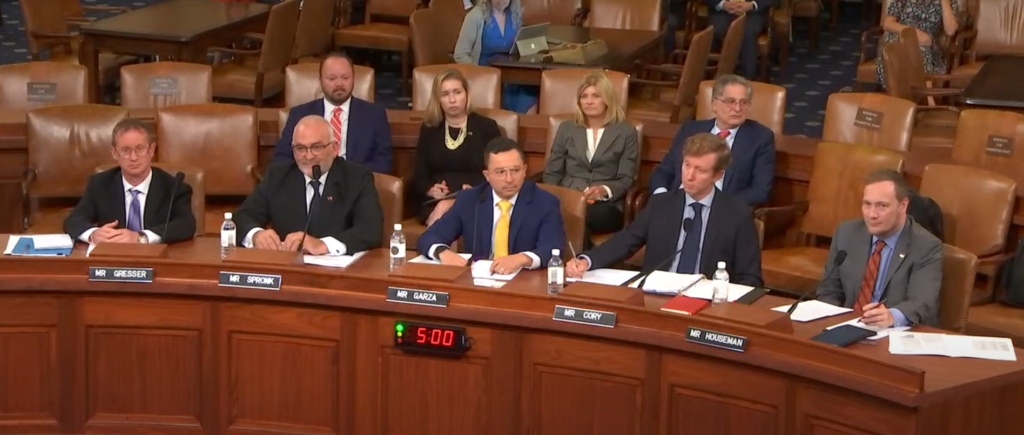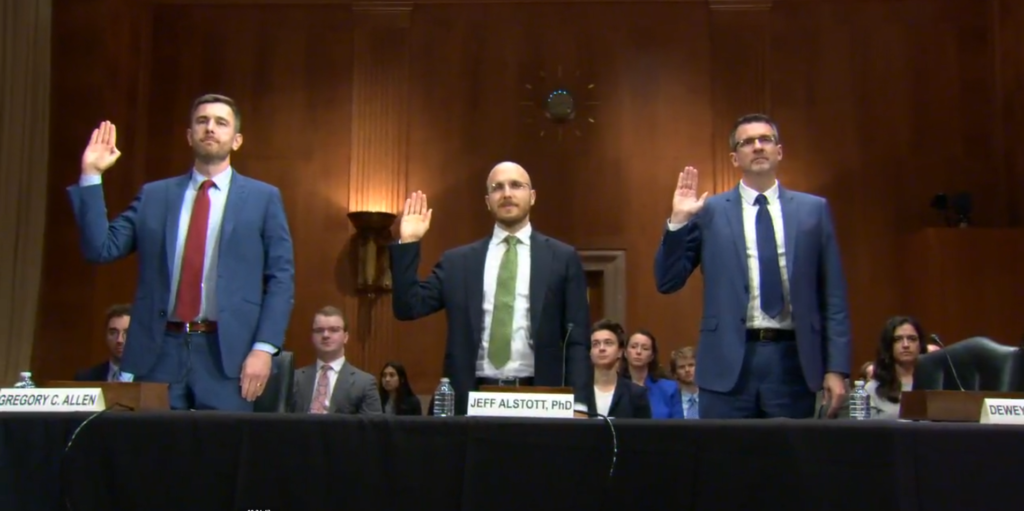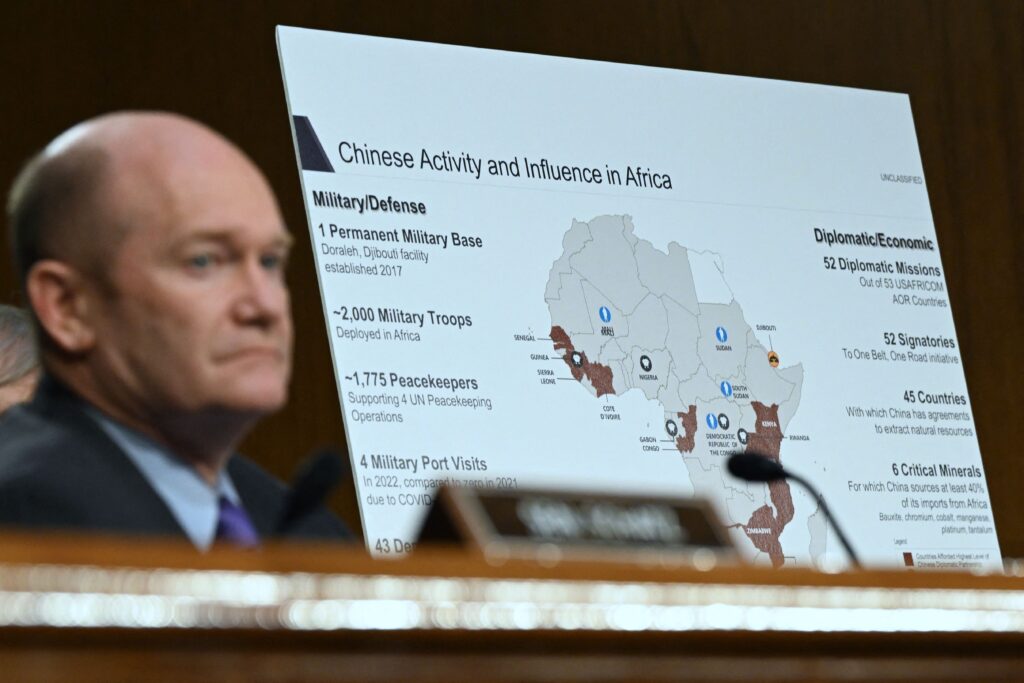
Research Associate

Part-Time Research Assistant
In May 2023, the team at the Institute for China-America Studies (ICAS) launched the U.S.-China Legislative and Executive Actions Directory (L.E.A.D.) Project to track and summarize trending critical issues and developments on China, emanating from both the White House and Capitol Hill.
This is the third release of the Legislative Actions Directory, covering U.S. legislative moves on China from September to December, 2023.
Given the House’s lasting quest to elect a new Speaker following the unprecedented removal of Kevin McCarthy(R-CA), and the legislative needs to discuss and pass several appropriations bills, U.S. congressional measures and activity on China were relatively limited in the last four months of 2023. While Congress broadly introduced and discussed around 276 bills on China and China-related issues from January to August, only about 90 China-related bills were introduced or witnessed significant progress from September to December 2023.
That being said, China remains an important and essential topic as U.S. lawmakers worked to ensure American competitiveness and support American interests. From September to December, 2023, three major trends are specifically worth noting. First, U.S. lawmakers continued to work on adjusting and rebalancing U.S.-China trade to fit America’s new strategic needs as they sought new methods to address familiar concerns such as the trade deficit, supply chain resilience, and labor and environmental standards in trade. Second, to support U.S. leadership and competitiveness in the technologies and industries of the future, Congress contemplated a wide range of methods such as restricting sensitive intellectual property and severing U.S.-China research and educational ties, in addition to continuing efforts to enhance domestic investment and prevent American capital from flowing into the Chinese market. Third, the shifting geopolitical landscape, particularly the historic Saudi-Iran deal and the reignited war in Gaza, intensified congressional attention on and concerns about China’s global influence. Especially with regard to China’s role in the international economic order, in international organizations, and in key regions such as Asia and the Middle East, U.S. lawmakers developed a deeper focus on addressing and containing the challenges that China poses at multilateral forums.
Trade continued to be one of the most popular topics in congressional debates related to China. In the last few months of 2023, legislative moves on trade and China addressed three topics primarily: (1) additional methods to address the U.S.-China trade deficit; (2) supply chain resilience; and (3) U.S.-led labor and environmental standards in trade.
During the September-December period, Congress actively consulted stakeholders and experts to explore additional policy possibilities to address the U.S. trade deficit with China. On September 20, 2023, the House Ways and Means Committee’s trade subcommittee held a hearing on reforming the Generalized System of Preferences (GSP). During the hearing, experts and industrial representatives argued that GSP—a program that waives tariffs on select imports from low- and middle-income countries—could be reformed and leveraged to reduce Chinese imports to the U.S. market, reduce barriers to cross-border digital trade, and expand market access for U.S. pork exports, among others. In a report on how to “win America’s economic competition with the Chinese Communist Party,” the House China Committee similarly supported the renewal of the GSP, a new tariff framework for Chinese imports, efforts to secure alternative markets for U.S. exports, and the negotiation of new treaties to facilitate digital trade. Additionally, the report also calls on Congress to “close the de minimis loophole,” echoing earlier legislative actions and statements as well as later momentum to pass a bill that reforms the United States’ de minimis rule. Meanwhile, legislative proposals such as H.Res.697 suggest that U.S. lawmakers continue to keep a close eye on China’s “unfair trade practices.” Introduced by Rep Mikie Sherrill (D-NJ) on September 18, 2023, the resolution expressed deep concerns about China’s “Made in China 2025” plan and the impact of relevant “CCP disruption, intelligence collection, intellectual property theft, unfair competitive practices, and commercial coercion” on U.S. businesses and research institutions.

Discussions about U.S. supply chain resilience continued with emphasis on critical minerals, the pharmaceutical industry and the transportation sector. In the field of critical minerals, the National Defense Authorization Act for Fiscal Year 2024 (FY24 NDAA), which became law on December 22, 2023, requires the Department of Defense to develop a strategy “to achieve critical mineral supply chain independence” from “a strategic competitor or adversary of the United States.” Earlier, on September 28, 2023, the Senate Committee on Energy and Natural Resources held a full committee hearing to “Examine Opportunities to Counter the People’s Republic of China’s Control of Critical Mineral Supply Chains.” During the hearing, two experts presented to the committee the global landscape with regard to the supply and demand of critical minerals, while U.S. Deputy Secretary of the Department of the Interior Tommy Beaudreau testified on U.S. domestic mining policies and regulations that impact the domestic production of critical minerals.
With regard to critical pharmaceuticals, Rep. Bill Posey (R-FL) reintroduced H.R.5575 – Safe Medicine Act on September 19, 2023 to “end” American reliance on “countries like China”’ for critical pharmaceuticals and generics. The bill directs the Secretaries of Health and Human Services, Defense, and Veterans Affairs “to end American over-dependence on Chinese pharmaceuticals” by revising government procurement policies and incentivizing domestic manufacturing of essential medicines, medical countermeasures, and critical inputs. The bill also expanded the Food and Drug Administration’s power to regulate drugs and medicines. The President is explicitly prohibited from waiving the requirements of the bill in “any trade deal.”
Recognizing the importance of ocean shipping for America’s supply chain, the U.S. Congress built on the Ocean Shipping Reform Act to discuss additional methods to “protect U.S. ports, shippers, and manufacturers from the CCP’s influence.” On November 3, 2023, Rep. Michelle Steel (R-CA) introduced H.R.6228 – Securing Maritime Data from Communist China Act, which refreshes bicameral support for the bill following its earlier introduction in the Senate on March 22, 2023. The bill “prohibits U.S. ports from using Chinese state-sponsored LOGINK software, allows the [Federal Maritime Commission (FMC)] to investigate foreign shipping exchanges like the Shanghai Shipping Exchange to preempt improper business practices, and authorizes the FMC to streamline data standards for maritime freight logistics.” Relatedly, FY24 NDAA prohibits federal funding from supporting any port that uses LOGINK.
Bearing in mind the need to identify and monitor other supply chain vulnerabilities, Rep. Rosa DeLauro (D-CT) introduced H.R.5703 – Strategic Homeland Investment in Economic and Logistical Defense (SHIELD) Act on September 26, 2023 to establish within the executive branch an “Office of Economic and Security Preparedness and Resilience” to set priorities and coordinate the administration’s efforts on supply chain resilience. Rep. Jim Banks (R-IN), a co-sponsor of the bill, said the bill would “shine a light on where other such vulnerabilities exist” besides critical minerals and pharmaceuticals and “help revitalize our industrial base to fix them.”
U.S. lawmakers also investigated various ways to make and enforce environmental and labor standards in trade, which has been a consistent matter of concern for Congress in recent years. During the September 20, 2023 hearing in front of the House Ways and Means Committee’s trade subcommittee on reforming the Generalized System of Preferences (GSP), experts and industry representatives discussed the possibility of leveraging GSP to promote higher labor and environmental standards in trade. On October 19, 2023, the House Committee on Homeland Security conducted a hearing evaluating the Department of Homeland Security’s enforcement of the Uyghur Forced Labor Prevention Act (UFLPA). During the hearing, all witnesses expressed support for tighter enforcement of UFLPA and some called for further reforms in areas such as supply chain transparency. As Congress continues to dig deeper into the detailed implementation of efforts to secure U.S. supply chains, more hearings and bills are expected in 2024 to readdress these concerns.
Efforts on the Hill have focused on three fronts to support U.S. leadership and competitiveness in emerging, cutting-edge and critical technologies: (1) to ensure domestic investment in key areas of research and development in the United States; (2) to deny Chinese companies access to sensitive intellectual property where the U.S. currently leads; and (3) to broadly sever partnerships and ties between U.S. and Chinese research and education institutions.
Deeply concerned about China’s technological progress, U.S. lawmakers continue to propose various ways to incentivize domestic investment in or otherwise support the research and development (R&D) of key technologies in the United States. Following the successful passage of the CHIPS and Science Act and its incentives for a broad range of R&D, legislative proposals have primarily focused on specific issues that need additional attention. For example, on September 21, 2023, U.S. Senator Jeff Merkley (D-OR) and Representatives Zoe Lofgren (D-CA) and Doris Matsui (D-CA) introduced S.2893/H.R. 5618 – the Clean Energy Victory Bonds Act, which would direct the issuance of $50 billion worth of “Clean Energy Victory Bonds” to support “energy efficiency, solar, wind, geothermal, and electric vehicle efforts.” Sponsors of the bill argue that “other nations, including China and Germany” are getting ahead in the implementation stage of clean energy technologies although “many of these technologies were invented in the United States.” On building a STEM workforce, S.2739 – Mathematical and Statistical Modeling Education Act, proposed by Senators Margaret Wood Hassan (D-NH) and Marsha Blackburn (R-TN), seeks to “modernize” mathematics in STEM education by promoting mathematical and statistical modeling and data-driven and computational thinking. Meanwhile, Senator Marco Rubio (R-FL) introduced S.2923 – Securing America’s R&D Advantage Act to further expand tax benefits to American companies related to research and experimental expenditure so long as these research and experimentation activities do not occur in China, Russia, Iran or North Korea.

For emerging technologies such as artificial intelligence (AI), lawmakers sought to explore and understand the evolving dynamics of the field through hearings and discussions. On September 19, 2023, the Senate Committee on Homeland Security held a hearing to examine how advancement in technology, e.g. artificial intelligence and quantum technology, may pose risks to public safety and security, having in mind China’s efforts to “gain supremacy in technology.” On October 18, 2023, the House’s Energy and Commerce Committee held a hearing during which lawmakers and experts called for the establishment of data privacy standards to ensure U.S. global leadership in data-related technologies such as AI. On October 19, 2023, the House Judiciary Committee’s Subcommittee on Courts, Intellectual Property, and the Internet held a hearing to examine the impact of the U.S.-China “arms race” in the development of artificial intelligence. On November 15, 2023, the Senate’s Foreign Relations Committee held a hearing featuring two senior State Department officials to understand how government policies on data and cybersecurity can help ensure U.S. global leadership in AI.
A wide range of legislative efforts also emerged with the goal of denying Chinese companies’ access to sensitive intellectual property in industries where the United States enjoys a technology lead. As articulated in the PREVAIL Act, proposed by Rep. Ken Buck (R-CO) and Senator Christopher Coons (D-DE) on June 27 and July 10, 2023, Congress is concerned that “China is leveraging and exploiting intellectual property as a critical tool within its national strategies for emerging technologies,” while “the United States has failed to similarly recognize the importance of intellectual property in securing its own national security, economic interests, and technological competitiveness.” Accordingly, H.R.5475 – Prohibiting Adversarial Patents Act, for example, proposes to withdraw any patent issued to companies and entities listed in the U.S. Entity List, Non-SDN CMIC List, the 1260H List, or the FCC’s Section 2 List. Rep. Scott Fitzgerald (R-WI) introduced the bill on September 14, 2023, joined by a group of Republican lawmakers.
More specifically on biotechnology, Rep. Tim Burchett (R-TN) introduced H.R.5830 – American Genetic Privacy Act to prohibit commercial DNA testing services from disclosing an individual’s genetic information to China or Chinese companies. Senator Gary Peters (D-MI) introduced S.3411 – Safeguarding American Genetic Data Act to create a comprehensive evaluative system to prevent biotechnology companies that have “significant ties to foreign adversaries” from accessing American genetic data and personal health information. Meanwhile, on blockchain technology and federal procurement, Reps. Zachary Nunn (R-IA) and Abigail Spanberger (D-VA) introduced H.R.6307 – CLARITY Act to prohibit the federal government from utilizing blockchain technology developed by China and “other foreign adversaries.” Taking a step back and seeking to gather more information on other fronts, Rep. Scott Fitzgerald (R-WI) introduced H.R.5404 – Countering Chinese Espionage Reporting Act on September 12, 2023, which directs the Attorney General to prepare annual reports to Congress regarding the Department of Justice’s activities to counter “Chinese national security threats, including trade secret theft, theft of United States intellectual property and research, and threats from non-traditional collectors.”
Alongside, a significant portion of congressional efforts were aimed at broadly severing ties and partnerships between U.S. and Chinese research and educational institutions. In September, several lawmakers turned to the negotiations and renewal of the U.S.-China Agreement on Cooperation in Science and Technology (S&T). On September 28, 2023, H.R.4665 – Department of State, Foreign Operations, and Related Programs Appropriations Act, 2024 was amended to include a provision that prohibits any funding appropriated under the act from being used to support the negotiation of the U.S.-China Science and Technology Cooperation Agreement. The bill passed the House on the same day but still awaits discussion and voting in the Senate. Relatedly, S.2894 – Science and Technology Agreement Enhanced Congressional Notification Act, introduced on September 21, 2023 by Senator Pete Ricketts (R-NE), requires the Biden administration to notify Congress before entering into, renewing or extending the Science and Technology Cooperation Agreement with China.
More specifically, building on Washington’s long-time concerns regarding “foreign malign influence” in the U.S. education system, U.S. lawmakers proposed to not only further tighten transparency and disclosure requirements but also prohibit partnerships and engagements of concern. On October 11, 2023, Rep. Michelle Steel (R-CA) introduced H.R.5933 – DETERRENT Act to “deter foreign adversaries’ influence in postsecondary education.” According to the bill’s fact sheet, published by the House Committee on Education and the Workforce, “each dollar institutions accept from foreign entities that do not share American values comes with strings attached” and constitutes a “serious” threat to national security.” Accordingly, the bill requires colleges and universities to report any foreign gift from “countries and entities of concern” regardless of the valuation, and prohibits them from entering into contracts with foreign countries or entities of concerns without obtaining a waiver. Similarly, S.3443 – Protecting Education from Malign Foreign Influence Act prohibits colleges, universities, elementary school and secondary schools that receive federal funding from entering into or maintaining covered relationships with covered persons. S.2726 – Countering Adversarial and Malicious Partnerships at Universities and Schools Act of 2023 (CAMPUS Act) prohibits K-12 schools that receive federal funds from partnering with universities and entities with connections to the Chinese military. H.R.5659 – Stop Funding Our Adversaries’ Research Act prohibits any federal research agency from funding or working with the Chinese government or Chinese companies. S.2750/H.R.5109 – Dump Investments in Troublesome Communist Holdings Act (DITCH Act) prohibits tax-exempt entities from funding Chinese companies. H.R.6816 prohibits elementary and secondary schools that receive federal education funds from receiving direct or indirect support from the Chinese government. H.R.1516 – DHS Restrictions on Confucius Institutes and Chinese Entities of Concern Act prohibits the Department of Homeland Security from entering into contract with institutions of higher education until the institution terminates all relationships with a Chinese entity of concern.
With the shifting landscape of global geopolitics, there was a build-up of legislative momentum through the fall of 2023 to address China’s influence around the world. Given the historic Saudi-Iran deal and the reignited war in Gaza, China’s role in the Middle East attracted the most attention on the Hill, leading to heated discussions as well as concrete deliverables such as H.R.3774 – Stop Harboring Iranian Petroleum (SHIP) Act. An increasing number of lawmakers also expressed interest in and concerns about China’s role in the global economic order and within international organizations. Finally, a number of bills were proposed to address China’s impact in other regions such as Asia and the Western hemisphere.
With tensions rising in the Middle East, much legislative attention was directed to China’s role in the region, specifically through its economic engagement with Iran. On November 3, 2023, H.R.3774 – Stop Harboring Iranian Petroleum (SHIP) Act passed the House with overwhelming support of 342 to 69. The bill aims to deprive Tehran of “resources to continue funding Hamas’s barbaric attack on Israel” by sanctioning foreign ports that knowingly accept Iranian petroleum shipments, refineries that process Iranian petroleum, and “any parties that transport, offload or otherwise deal with Iranian petroleum.” In addition, the bill specifically tasked the Administrator of the Energy Information Administration (EIA) to issue an annual report on Iran’s “growing” petroleum exports to China. In urging support for the bill, Rep. Michael Lawler (R-NY), the lead sponsor of the bill, described it as “a ‘warning shot’ to Iran and China,” noting that China is “greatest purchaser of Iranian petroleum.” In applauding the bill’s passage in the House, Senator Marco Rubio (R-FL) argued that the bill helped deter “Iranian oil sales to China’s genocidal regime,” which, according to Senator Rubio, “continue to fund the Ayatollah’s ability to repress Iranian protestors and finance its proxies Hamas and Hezbollah.” The SHIP Act was also introduced in the Senate on June 6, 2023 and has a bipartisan group of co-sponsors but it is unclear whether or when the Senate would vote on the bill.
In addition to the SHIP Act, several other bills were also proposed to address China-Iran economic or political ties. On October 11, 2023, Rep. Michael Lawler (R-NY) and Rep. Josh Gottheimer (D-NJ) introduced H.R.5923 – Iran-China Energy Sanctions Act, which aims to “cut off sources of funding to Iran” and prevent China from “remain[ing] Iran’s top customer” by using financial sanctions to deter “small, independent Chinese refiners” from processing Iranian petroleum. The bill passed the House Financial Services Committee unanimously on November 14, 2023. On December 11, 2023, Senator Marsha Blackburn (R-TN), along with a group of Republican Senators, introduced S.3461 – Iran China Accountability Act. The bill would block the usage of any funding to advance a nuclear agreement with Iran “until they terminate their ties with the CCP and terrorist groups like Hamas.” Other bills took a step back and resorted to first requiring the Biden administration to introduce strategies and deliver reports. On November 7, 2023, S.3235 – End Iranian Terrorism Act was introduced, which requires “a strategy to counter the role of the People’s Republic of China in evasion of sanctions imposed by the United States with respect to Iran.” On September 12, 2023, H.R.3152 – Fight CRIME Act passed the House. Sponsored by Rep. Michael T. McCaul (R-TX), the bill sanctions Iran’s missile and drone program, and the bill includes provisions that require a report on “actions by the People’s Republic of China, the Russian Federation, or any other country to prevent, interfere with, or undermine efforts” to carry out certain United Nations decisions and investigations related to Iran’s nuclear program.
At the same time, lawmakers proposed several bills to initiate in-depth investigation and review of China’s impact on the international economic order, especially through the Belt and Road Initiative (BRI). On September 19, 2023, Rep. Scott Fitzgerald (R-WI) introduced H.R.5565 – Build Responsible Infrastructure Development for the Global Economy Act (BRIDGE Act), which requires a report from the administration regarding China’s efforts to “utilize the Belt and Road Initiative to undermine the United States-led international world order” as well as “a detailed strategy regarding how the United States Government intends to counter such Initiative.” More specifically, S.2752 – Belt and Road Oversight Act proposes to “strengthen America’s ability to counter the Chinese Communist Party’s economic coercion and predatory lending tactics” by requiring the administration to comprehensively review the BRI and establishing a China Country officer at each U.S. embassy worldwide to track China’s investment and “predatory lending practices.”
Additional legislative attention and support was also organized to counter China’s influence in international organizations. Continuing prior discussions and proposals on China’s voting rights at the International Monetary Fund, a number of additional bills were introduced in both chambers of Congress to prohibit the United States from supporting China to gain more voting rights at the Fund. With regard to the Law of the Sea, Senator Mazie Hirono (D-HI) and a bipartisan group of 8 lawmakers reintroduced S.Res.466 to call upon the Senate to ratify the United Nations Convention on the Law of the Sea (UNCLOS). Echoing the Senator’s earlier statement in 2021, Senator Hirono argued that because the United States has not ratified UNCLOS, it is prevented from “engaging in important international conversations about our oceans and seas.” Accordingly, the ratification of UNCLOS would allow the U.S. to “counter countries like Russia and China that continue to exploit our absence from key ocean governance diplomatic forums,” and would “strengthen our strategic position on issues pertaining to the [South China Sea and the Arctic].”

With regard to China’s presence in Asia, H.R.5618 – Thwarting Regional Adversary Investments Now Act turned the focus to China’s overseas investment and lending, especially through the Belt and Road Initiative (BRI). The bill aims to “safeguard countries targeted by China’s predatory loans and investments by starting a dialogue to assess and mitigate the associated risks.” Accordingly, the bill directs USAID to help train officials of non-adversarial governments in South and Central Asia to assess and mitigate risks of China’s investment and lending practices in these regions. Specifically on Mongolia, H.R.6539/S.3368 – Mongolia Third Neighbor Trade Act aims to increase direct trade between the United States and Mongolia, “strengthen the economy of a critical U.S. partner” and “shield” Mongolia from “economic coercion” from China by granting duty-free access to cashmere products from Mongolia.
Finally, congressional attention continued to be spotlighted on China’s presence in the Western hemisphere. For example, several bills were proposed to counter “China’s growing malign influence in the Western Hemisphere” through sanctioning involved parties. Others sought to counter the influence of China and Russia by deepening regional economic integration and by enhancing economic and national security engagements.
By the end of 2023, the 118th Congress finally developed a systematic and structural approach to China. This new Congress, in many ways, is very different from its predecessors. While traditionally competitive issues such as ideology and national security remain eye-catching and pressing, there is little taste in having in-depth discussion on confrontation with China. This new Congress also shows very little interest in discussing potential cooperation with Beijing. It is more interested in discussing issues that fall between confrontation and cooperation. These issues, through an entire year of refining, zoomed in on three critical areas: trade, technology, global influence and leadership. However, contrary to traditional approaches to these three areas, the 118th Congress views these issues purely from an angle of a strategic competition with China.
While trade continues to be the most popular issue of discussion, the 118th Congress shows limited interest in trade deficit or American jobs loss. Instead, it pays more attention to unfair trade practices and supply chain orientation.
The 118th Congress’s technology discussion worries about American technology development, but it is also concerned about China’s technological advancement—whether through legit development or IP theft—which would put America in a disadvantageous position.
The 118th Congress is also concerned about China’s growing international influence and its global leadership initiatives in regions such as the Middle East and South America where the U.S. traditionally has more influence.
As the U.S. election approaches in 2024, the 118th Congress will have limited time to push forward America’s competition with China. However, as the first U.S. Congress that has come fully onboard of the idea of a strategic competition with China, the more the 118th Congress does, the stronger of a mark it will leave on the U.S.-China bilateral relationship, particularly during a period when the executive power to direct U.S. foreign policy and approach is relatively lower.

The Institute for China-America Studies is an independent nonprofit, nonpartisan research organization dedicated to strengthening the understanding of U.S.-China relations through expert analysis and practical policy solutions.
1919 M St. NW Suite 310,
Washington, DC 20036
icas@chinaus-icas.org
(202) 968-0595
© 2025 INSTITUTE FOR CHINA-AMERICA STUDIES. ALL RIGHTS RESERVED.
The U.S. Auto Industry Has Not Lost Yet—But It Must Compete Smarter